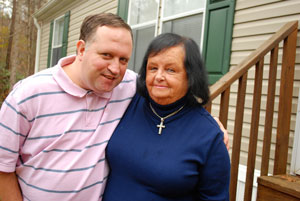DHHS overhaul to hit home
By Taylor Sisk
Staff Writer
Jim Wells is back in private practice now in Chapel Hill, but until just recently he served as attending psychiatrist for Female Continuing Care at Dorothea Dix Hospital.
In the couple of years he was there, he became familiar with the culture of the state’s behavioral health care system, and he has it on good authority that a popular handbook called High-Velocity Culture Change has made an impression on some of the individuals driving the latest overhaul of that system.
“I know some of them have been influenced by this book,” Wells says.
Among the book’s aphorisms are, “Analyzing your present culture is like going to history class, when you could learn more valuable stuff from studying the future.” And: “Start out fast and keep trying to pick up speed. Leave skid marks.”
Wells certainly isn’t opposed to the principles behind the overhaul – to serve more people living with mental health, developmental disability and substance abuse issues and to more efficiently and cost-effectively manage services. He hopes though that something has been learned from a history of rushing to the next solution without doing due diligence.
Meanwhile, another Chapel Hill resident, Toni Wilson, is praying that her developmentally disabled son, Michael, who’s in his 30s, and also suffers from lifelong mental health issues, won’t be a skid mark on the road to further ill-fated reform.
Uncertain days
Toni Wilson has witnessed the state’s mental health care reform peregrinations and seen her son’s services curtailed.
Thava Mahadevan, executive director of XDS Inc., a Pittsboro-based agency that’s worked with Michael in recent years, understands his mother’s concerns: “Mom’s terrified about what’s going to happen to Michael.”
Uncertainty isn’t good for Michael Wilson. His father was murdered when he was 2. XDS has provided him with a number of support services – sometimes, simply, much-needed companionship – but those services have been incrementally defunded by Medicaid.
“If they take the services away,” his mother says, “he’s got to go to the doctor much more than he did; he’s got to take much more medication than he did. That’s going to cost the state.”
Zoloft has been good for her son, Wilson says.
“But it’s not enough. We need the people. Everybody needs somebody to talk to and somebody to help them out through life.
“We all sometimes get upset or depressed. But when people like Michael, who have severe problems, get upset, they don’t know how to deal with it; they don’t know what to do. The only thing they know – I mean, his body will get to jumping and going every which way – is to act out. … That’s the only way he knows to let it out.
“When you take him out, you’ve got to watch him,” his mother says. “Some women think that he’s mean and that he’s going to hurt them and they’re a little afraid of him. But he’s not really going to hurt them.”
But she worries that a situation could get out of control. Michael struggles with boundaries, and sometimes crosses them. He once tried to pull a pizza delivery driver into the house.
Mahadevan worries about what would happen if Michael were to cross too far beyond those boundaries.
“I’m afraid his mother would have a huge breakdown if he were to be sent to prison,” he says. “It would be devastating. And he wouldn’t survive.”
Consolidation
The proposed new system is designed, proponents say, to better serve people like the Wilsons. Under the plan, agencies that oversee mental health, developmental disability and substance abuse services will be granted a 1915(b)(c) waiver of the Social Security Act, moving them from a fee-for-service delivery system to a managed-care system.
The state’s 23 local management entities (LMEs), which oversee publicly funded behavioral health care services, will be consolidated in an attempt to create administrative savings and efficiencies. Legislation passed this session stipulates that the consolidated LMEs will be given Medicaid, state and local funds in a lump sum, resulting in a managed-care system under the 1915(b)(c) waiver. The plan must now be approved by the federal government.
OPC Area Program, the LME that serves Orange, Person and Chatham counties, is preparing to merge with Piedmont Behavioral Healthcare (PBH), which serves Cabarrus, Davidson, Rowan, Stanly and Union counties. In a pilot project begun in 2005, PBH has been the only LME to operate under the full 1915(b)(c) waiver, and will serve as the model for the statewide system.
It’s all new ground. One high-level state official who asked not to be identified said of the shift to a statewide waiver system, “It’s like moving from a slingshot to a rocket launcher.” It’s “the biggest thing to happen” to mental health, developmental disability and substance abuse services in “a long, long time” and, the official says, will put North Carolina on the cutting edge in the delivery of these services.
The objective is to provide more and better services to more individuals. The fee-for-service system had the potential to create incentives to provide patients with services they may not have needed, and proponents of managed care say that when LMEs are given lump sums with which to provide services to all who require them, equity will prevail. Clients, they say, will receive what they need – no more, and no less.
“We can’t keep doing what we’re doing,” says Rep. Verla Insko of Orange County, a primary sponsor of the legislation. “There will be managed care. That’s for certain.”
In a May email to advocates, Patricia Porter, a consultant to the General Assembly on health and human services, echoed that sentiment: “The cost overruns, long waiting lists, duplication of administrative operations, lack of assurance that people are receiving the services they need and prefer … cannot continue.”
Insko acknowledges that, “Some things aren’t going to work, and we’ll have to back up.”
She also acknowledges that she initially warned state Department of Health and Human Services Secretary Lanier Cansler that the move to a statewide waiver system was proceeding too quickly, that the target should be 2014.
Cansler himself said in 2009 that, “Using a Medicaid waiver to shift to managed behavioral healthcare represents a significant shift in thinking for all stakeholders in North Carolina. Such a change takes multiple years to research, implement and refine.”
But Insko and Cansler are now on the fast track to a statewide waiver system.
According to Insko, Cansler has said, “’If we’re going too fast, we’ll know by next year, and I’ll slow it down.’”
Why the rush?
The transition has come fast.
A report commissioned by the DHHS and released last August by Mercer Government Human Services Consultants said the department was not fully prepared to move forward with the administration of the proposed system. It cited “an absence of senior licensed clinicians to help guide policies and procedures” and a “significant lack of IT tools and a limited number of technical staff to support efficient business operations and reporting requirements.”
Steve Jordan, director of the Division of Mental Health, Developmental Disabilities, and Substance Abuse Services, acknowledges Mercer’s assessments.
“Mercer did point to some infrastructure challenges,” he says, “and these are being addressed independently and as a part of the individual and executive-level oversight groups.”
As for the LMEs, Jordan says that the pace of implementation won’t “outstrip the readiness of the sites to do the work.
“Each will have to pass rigorous readiness reviews, both desk reviews and onsite reviews, and correct any shortcomings, before that site will be allowed to function as a 1915(b)(c) waiver site.”
Concern
Of the three constituencies, the developmental disability community is most concerned. Advocates contend that managed care is a recovery model, but people don’t recover from developmental disabilities.
“This waiver was set up for mental health,” Carrboro self-advocate Ellen Perry says; “it’s not set up for the DD population.” She’s concerned about losing hours of assistance with getting around that “keeps me safe and lets me be out in the community.”
Mary K. Short, a Taylorsville advocate and mother of a 31-year-old daughter with a severe developmental disability, questions whether PBH’s pilot project, the model for the statewide plan, has really saved money.
“It does not seem logical to me that any savings exist if there is a waiting list of people eligible for services,” Short says.
PBH CEO Pam Shipman says that the managed care system has allowed her agency to introduce what are called B-3 services.
“The B-3 services that we have added include respite and supported employment,” Shipman says. “We have experienced significant reductions in our waiting list for people with intellectual and developmental disabilities because of these services. This was accomplished by moving people with Medicaid coverage to the B-3 services, thus reserving the state-funded services for people that do not have Medicaid.”
More must be done with less, says Jordan.
“The likelihood of there being no new [federal] funding makes the waivers even more important,” he says, “because waivers allow the current resources to be reallocated in ways that create savings and allow for those savings to be reinvested in services in the system.”
“Because the waivers are operated as a captitated system, the LMEs must predict how many individuals are in need of service in order to determine the amount of money they will receive to provide these services,” says Rep. Jeff Barnhart of Cabarrus County, another primary sponsor of the legislation. “There are a number of strategies to determine this information, and this data is closely monitored by the Division of Medical Assistance.”
Jordan says that though each system is unique, his office is learning from other states’ experiences. Managed care has worked elsewhere.
In a 2009 report for the National Leadership Consortium on Developmental Disabilities, Robert Gettings, former head of the National Association of State Directors of Developmental Disabilities Services, wrote that in his research on states that have implemented managed care, no one, not even those who were initially its sharpest critics, suggested that “people with developmental disabilities would be better off were [developmental disability] services to be carved out of the managed care program.”
Mahadevan is guardedly optimistic. He likens the change to replacing a credit card with a debit card. “You know your limit.”
Hoping
Gettings warned in his report that, “A managed care system is complex, with many moving parts; and, to function effectively, these systems require the active engagement of skilled management staff at the state level.”
Is the state ready?
Toni Wilson certainly hopes so.
“Thava says he never knows what’s going to happen with services. And Michael don’t need to go through that, because it worries him, puts pressure on him and makes him act out. He came to me and said, ‘They’re cutting out all my stuff.’ And then he can tell I’m upset about it. It’s a mess. I don’t know what to expect.”
The uncertainty frightens Perry as well.
“I’m scared for everybody,” she says.
Insko can understand why. But, she says, “There’s good reason to be fearful if we don’t make changes.”
- Ellen Perry's blog
- Log in to post comments



